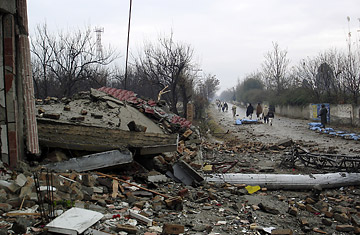
The site where a suicide attacker detonated a bomb near a guest house where military officers were staying. The attack happened in the town of Kabal in the Swat region, a former tourist resort where security forces have been battling loyalists of a pro-Taliban cleric.
Already blamed by Pakistan and the CIA for killing Benazir Bhutto, Baitullah Mehsud is just getting started. The articulate, baby-faced commander of the Tehrik-i-Taliban in Pakistan's tribal wilds along the Afghan border is waging an increasingly coordinated insurgency threatening further destabilization on the eve of parliamentary elections. His forces have embarrassed the Pakistani military in recent weeks by attacking its forts, inflicting heavy losses and seizing weapons before retreating into the mountains of South Waziristan, Mehsud's home turf.
In what appears to be a coordinated effort, the attacks on the forts in South Waziristan came at the same time as the electrical grid and another fort in neighboring North Waziristan came under attack. The upsurge of attacks in an area that has been relatively calm of late rings alarm bells for terrorism analyst Muhammad Amir Rana, director of the Pakistan Institute For Peace Studies. "We are seeing this now, simultaneous attacks from different regions. This is a strong indication that different groups are working together. They are coordinating attacks, sharing the same objective."
The thirtysomething Mehsud cut his teeth fighting the Soviets in Afghanistan, and later sharpened his political aspirations while serving the Afghan Taliban's Mullah Omar, to whom he refers as his "Ameerul Momineen," or Commander of the Faithful. But some local analysts see Mehsud as potentially an even more formidable jihadist than his mentor.
Mehsud is an affable jokester who wears a camouflage vest over his traditional tunic and trousers, according to Ahmad Muaffaq Zaidan, Pakistan bureau chief for al-Jazeera. Zaidan interviewed Mehsud just days after he was chosen by several diverse militant groups in December to lead the new Tehrik-i-Taliban movement. The interview, which will air Friday, is a first for the commander who seems to take his PR cues from the notoriously camera-shy Mullah Omar. Mehsud was surprisingly plump, says Zaidan, but his soft, stout figure and easy camaraderie belie a powerful charisma and laser-like focus. Zaidan attributes some of Baitullah's savvy to better education and more exposure to al-Qaeda: "These militant leaders now, they are living in the eye of the storm. They learn more in one minute than the Taliban did in a year."
By comparison, says Zaidan, "I interviewed Mullah Omar once, in 1995. He was just starting out, like [Baitullah] is. But Baitullah is much stronger, much better. His way of talking, how he acts — he is a much more powerful leader."
The Pakistani government appears to agree. It has accused Mehsud of orchestrating the attack that killed former Prime Minister Bhutto in December, and CIA Director Michael Hayden has indicated that he supports this conclusion. Authorities are currently interviewing Aitzaz Shah, a 15-year-old militant who confessed last week that he had been part of a backup plan, one of several local suicide cells scattered across the country that was ordered to attack when the right opportunity presented itself.
A recent Gallup poll shows that more than half of Pakistanis remain unconvinced; some even suspect government involvement in the assassination. Mehsud, through his spokesman, has denied involvement, but Zaidan believes Mehsud would certainly have had a motive to kill Benazir. "If I put myself in his shoes, of course I'm not going to take credit. Why give a clear answer to the intelligence services? Make them work. From Mehsud's interest point, it suits him to kill her. Musharraf is no longer of use to the West; he is too unpopular. But Benazir could deliver. She had popular support. These people think once you eliminate Bhutto, you have given a big blow to the government."
To Rana, the confession of the boy bomber meshes well with the modus operandi of Mehsud's loose coalition. "Mehsud is not only organizing in the tribal areas," says Rana. "He is trying to unify all of the insurgent movements, even from Karachi and Baluchistan. These groups will have mutual understanding on one issue, and they will work together to achieve their common goals."
Their primary agenda is ousting Western forces from Afghanistan, and they have made clear their intention to attack all local allies of the U.S. and NATO. That makes the Pakistani government a prime target, and U.S. and Nato commanders in Afghanistan have noted that al-Qaeda and Taliban forces in the border areas appear to have shifted their focus away from Afghanistan to striking targets in Pakistan.
The Tehrik-i-Taliban is due to meet again in the coming days, says Rana. An umbrella movement in its infancy, it will need time to iron out internal differences and optimize its operational capacity. But already, Rana has seen evidence of enhanced capabilities and the sharing of training and resources. And, following the classic guerrilla warfare playbook, the movement is combining military assaults on army posts with political work among the local civilian population. "Once they are united, with support bases in Karachi, Baluchistan and the North West Frontier Province, they will form small Taliban committees," says Rana. "They will not be violent or militant. They will preach to the people, they will say this is good, and this is against Islam. They will praise those who go to mosque and shame the others. They will tell the people they are just there to bring Sharia. Once they are accepted, then will come their militias."
That vision sounds frighteningly similar to the rise of the Taliban in Afghanistan in the mid-1990s. Of course, Mehsud was with Mullah Omar when the Taliban first started. Clearly he took notes.
—With reporting by Rahimullah Yusufzai/Peshawar
